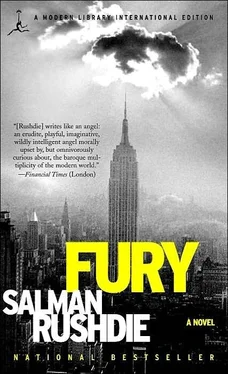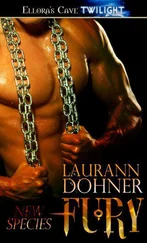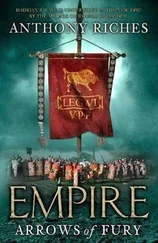Salman Rushdie - Fury
Здесь есть возможность читать онлайн «Salman Rushdie - Fury» весь текст электронной книги совершенно бесплатно (целиком полную версию без сокращений). В некоторых случаях можно слушать аудио, скачать через торрент в формате fb2 и присутствует краткое содержание. Город: New York, Год выпуска: 2002, ISBN: 2002, Издательство: Random House Publishing Group, Жанр: Современная проза, на английском языке. Описание произведения, (предисловие) а так же отзывы посетителей доступны на портале библиотеки ЛибКат.
- Название:Fury
- Автор:
- Издательство:Random House Publishing Group
- Жанр:
- Год:2002
- Город:New York
- ISBN:0679783504
- Рейтинг книги:5 / 5. Голосов: 1
-
Избранное:Добавить в избранное
- Отзывы:
-
Ваша оценка:
- 100
- 1
- 2
- 3
- 4
- 5
Fury: краткое содержание, описание и аннотация
Предлагаем к чтению аннотацию, описание, краткое содержание или предисловие (зависит от того, что написал сам автор книги «Fury»). Если вы не нашли необходимую информацию о книге — напишите в комментариях, мы постараемся отыскать её.
Fury — читать онлайн бесплатно полную книгу (весь текст) целиком
Ниже представлен текст книги, разбитый по страницам. Система сохранения места последней прочитанной страницы, позволяет с удобством читать онлайн бесплатно книгу «Fury», без необходимости каждый раз заново искать на чём Вы остановились. Поставьте закладку, и сможете в любой момент перейти на страницу, на которой закончили чтение.
Интервал:
Закладка:
One Sunday he rubbed shoulders with slim-hipped gay-pride prancers, the next weekend he got jiggy beside a big-assed Puerto Rican girl wearing her national flag as a bra. He didn’t feel intruded upon amid these multitudes; to the contrary. There was a satisfying anonymity in the crowds, an absence of intrusion. Nobody here was interested in his mysteries. Everyone was here to lose themselves. Such was the unarticulated magic of the masses, and these days losing himself was just about Professor Solanka’s only purpose in life. This particular rainy weekend there was a calypso beat in the air, not the mere Harry Belafonte Jamaica-farewells and jackass-songs of Solanka’s somewhat guiltily fond memory (Now I tell you in a positive way / don’ tie me donkey down dere /’cause me donkey will jump and bray / don’ tie me donkey down dere!”), but the true satirical music of the Jamaican troubadour-polemicists, Banana Bird, Cool Runnings, Yellowbelly, live in Bryant Park and on shoulder-high boomboxes up and down Broadway.
When he got home from the parade, however, Professor Solanka was seized by melancholy, his usual secret sadness, which he sublimated into the public sphere. Something was amiss with the world. The optimistic peace-and-love philosophy of his youth having given him up, he no longer knew how to reconcile himself to an increasingly phony (he loathed, in this context, the otherwise excellent word “virtual”) reality. Questions of power preyed on his mind. While the overheated citizenry was eating these many varieties of lotus, who knew what the city’s rulers were getting away with—not the Giulianis and Safirs, who responded so contemptibly to the complaints of abused women until amateur videos of the incidents showed up on the evening news, not these crude glove-puppets, but the high ones who were always there, forever feeding their insatiable desires, seeking out newness, devouring beauty, and always, always wanting more? The never encountered but ever present kings of the world-godless Malik Solanka avoided crediting these human phantoms with the gift of omnipresence the petulant, lethal Caesars, as his friend Rhinehart would say, the Bolingbrokes cold of soul, the tribunes with their hands up the mayor’s and police commissioner’s Coriolanuses… Professor Solanka shuddered faintly at this last image. He knew himself well enough to be conscious of the broad scarlet streak of vulgarity in his character; still, the crude pun shocked him when he thought of it.
Puppet-masters were making us all jump and bray, Malik Solanka fretted. While we marionettes dance, who is yanking our strings?
The phone was ringing as he came through his front door, the rain still dripping off his hat brim. He answered it snappishly, snatching off its base the cordless unit in the apartment’s entrance hall. “Yes, what, please?” His wife’s voice arrived in his ear via a cable on the Atlantic bed, or maybe in these days when everything was changing it was a satellite high above the ocean, he couldn’t be sure. In these days when the age of pulse was giving way to the age of tone. When the epoch of analog (which was to say also of the richness of language, of analogy) was giving way to the digital era, the final victory of the numerate over the literate. He had always loved her voice. Fifteen years ago in London he had telephoned Morgen Franz, a publishing friend who by chance was away from his desk, and Eleanor Masters, passing by, had picked up the clamoring instrument; they had never met but ended up talking for an hour. A week later they dined at her place, neither of them alluding to the inappropriateness of so intimate a venue for a first date. A decade and a half of togetherness ensued. So, he fell in love with her voice before the rest of her. This had always been their favorite story about each other; now, of course, in love’s brutal aftermath, when memory was reinvented as pain, when voices on the phone were all they had left, it had become one of the saddest. Professor Solanka listened to the sound of Eleanor’s voice and with some distaste imagined it being broken up into little parcels of digitized information, her low lovely voice first consumed and then regurgitated by a mainframe computer probably located someplace like Hyderabad-Deccan. What is the digital equivalent of lovely, he wondered. What are the digits that encode beauty, the number-fingers that enclose, transform, transmit, decode, and somehow, in the process, fail to trap or choke the soul of it. Not because of the technology but in spite of it, beauty, that ghost, that treasure, passes undiminished through the new machines.
“Malik. Solly.” (This, to annoy him.) “You’re not listening. You’ve gone off inside your head on one of your riffs and the plain fact that your son is ill hasn’t even registered. The plain fact that I have to wake up every morning and listen to him asking—unbearably asking—why his father isn’t home hasn’t registered. Not to mention the plainest fact of all, namely that without a shred of a reason or a scrap of credible explanation you walked out on us, you went off across an ocean and betrayed all those who need and love you most, who still do, damn you, in spite of everything.” It was only a cough, the boy didn’t have anything life-threatening, but she was right; Professor Solanka had withdrawn into himself. In this small telephonic matter as in the greater business of their life once together and now apart, their marriage once considered indissoluble, the best partnership any of their friends had ever witnessed; and of their joint parenthood of Asmaan Solanka, now an improbably beautiful and gentle-natured three-year-old, the miraculously yellow-haired product of dark-haired parents, whom they had named so celestially (Asmaan, n., lit. the sky, but also fig. paradise) because he was the only heaven in which they could both wholeheartedly and unreservedly believe.
Professor Solanka apologized to his wife for his distractedness, whereupon she wept, a loud honking noise that squeezed at his heart, for he was by no means a heartless man. He waited “silently for her to stop. When she did, he spoke in his most mandarin manner, denying himself—denying her—the slightest hint of emotion. “I accept that what I have done must feel inexplicable to you. I am remembering, however, what you yourself taught me about the importance of the inexplicable”—here she hung up on him, but he finished the sentence anyway—“in, ah, Shakespeare.” Which unheard conclusion conjured up the vision of his wife in the nude, of Eleanor Masters fifteen years ago in her long-haired, twenty-five-year-old glory lying naked with her head in his lap and a battered Complete Works, bound in blue leather, face down across her bush. Such had been the indecorous but sweetly swift conclusion of that first dinner. He had brought the wine, three expensive bottles of Tignanello Antinori (three! Evidence of a seducer’s excessiveness there), while she had roasted a lamb shank for him and also served, to accompany the cumin-scented meat, a salad of fresh flowers. She wore a short black dress and walked lightly, and barefoot, through a flat much influenced by Bloomsbury Group design and craftwork, and boasting a caged parrot who imitated her laugh: a big laugh for so delicate a woman. His first and last blind date, she turned out to be fully the equal of her voice; not only beautiful but smart, somehow both confident and vulnerable, and a great cook. After eating many nasturtiums and drinking copiously of his Tuscan red, she began to explain her doctoral thesis (they were sitting on the floor of her living room by now, lounging on a handmade rug woven by Cressida Bell), but kisses interrupted her, for Professor Solanka had fallen tenderly, like a lamb, in love. They would happily argue, during their long good years, about which of them had made the first move, she always hotly (but with bright eyes) denying that she could ever have been so forward, he insisting—while knowing it to be untrue that she had “thrown herself at him.”
Читать дальшеИнтервал:
Закладка:
Похожие книги на «Fury»
Представляем Вашему вниманию похожие книги на «Fury» списком для выбора. Мы отобрали схожую по названию и смыслу литературу в надежде предоставить читателям больше вариантов отыскать новые, интересные, ещё непрочитанные произведения.
Обсуждение, отзывы о книге «Fury» и просто собственные мнения читателей. Оставьте ваши комментарии, напишите, что Вы думаете о произведении, его смысле или главных героях. Укажите что конкретно понравилось, а что нет, и почему Вы так считаете.











